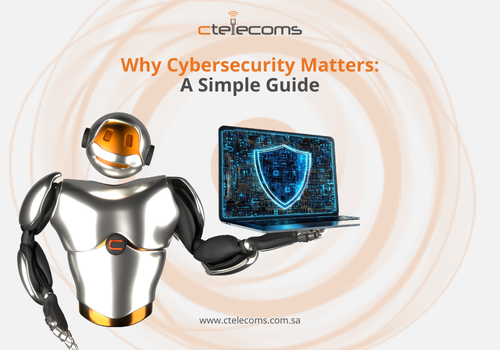

2025/02/10 IT & Cyber-Security Solutions 236 visit(s) 2 min to read
Ctelecoms

In the current cyber-secure environment, it is imperative for all individuals and businesses to implement robust protective measures. Cybersecurity ensures the protection of devices and data from potential threats such as hackers.
Some of the main reasons why it is so important are listed below.
Cybersecurity is a must-have these days, especially if you've got important stuff like personal info, medical records, or even secret business ideas. If you don't have good security in place, hackers can easily steal your data.
For instance, if a hospital’s database is breached. Suddenly, all the patient records, such as medical histories, and personal identification details – could be out there for anyone to see. This is a huge deal! People could get their identity stolen, and nobody would trust that hospital anymore.
For businesses, cybersecurity is like a safety net. It keeps things running smoothly and protects their reputation.
A well-known incident involving Target demonstrates the consequences of a data breach.
Hackers stole sensitive data from millions of customers, including credit card numbers, addresses, and email addresses. This resulted in a significant financial penalty for Target. However, the most substantial damage was to their reputation, which took a considerable amount of time to rebuild
Theft: Hackers can steal valuable data like customer information, intellectual property, and financial records. This can lead to direct revenue loss and damage to a company's bottom line.
System Repairs: Cyberattacks often require significant resources to repair damaged systems, restore data, and improve security measures. This can be expensive and time-consuming.
Loss of Trust: A data breach can severely damage a company's reputation, leading to a loss of customer trust and loyalty. This can negatively impact future sales and revenue.
In essence, investing in strong cybersecurity measures is not just about protecting sensitive data, but also about safeguarding a company's financial health and long-term success.
When a company shows it takes cybersecurity seriously, it earns the trust of its customers and everyone else involved. People respect businesses that protect their own information and, more importantly, their customers' data.
Think about a bank. If they have strong security, customers know their money is safe. This builds trust and makes people more likely to choose that bank.
Cybersecurity encompasses a wide range of techniques and technologies aimed at protecting computer systems, networks, and data from unauthorized access, use, disclosure, disruption, modification, or destruction. Here are some of the key types:
Focuses on securing computer networks from intruders and malware.
Web security specifically focuses on safeguarding websites, web applications, and web services from online threats.
Cisco Identity Services Engine (ISE) is a network security platform that controls who and what devices can access your network. It verifies user identities, enforces access policies based on user roles and device security posture, and monitors network activity to enhance security and simplify network management.
Email is a primary target for cybercriminals:
Cisco Secure Email is like a firewall for your emails! It shields them from all kinds of threats, including phishing scams, ransomware, and fake emails.
It also keeps your sensitive data safe with encryption and tools to prevent accidental leaks. You can choose how you want to use it – in the cloud, a mix of cloud and on-premises, or entirely on your own devices.
And the best part? It works seamlessly with Cisco SecureX, their powerful security platform, giving you a complete view of your entire security environment.
The rise of remote working has ushered in a new era of cybersecurity challenges. As employees increasingly work from home, often on personal or less secure networks, the risk of security breaches has increased significantly. Traditional office environments typically have strong security measures in place that are often lacking in remote working environments. This shift requires a robust remote access security framework, enhanced device protection measures and comprehensive employee training on cybersecurity best practices.
As a leading telecommunications provider in Saudi Arabia, CTELCOMS understands the challenges that Saudi businesses face in securing their data and networks. We offer a comprehensive suite of cybersecurity solutions designed to meet the specific needs of your organization.
Our team of security experts can help you assess your vulnerabilities, develop a customized security strategy and implement the latest security technologies.